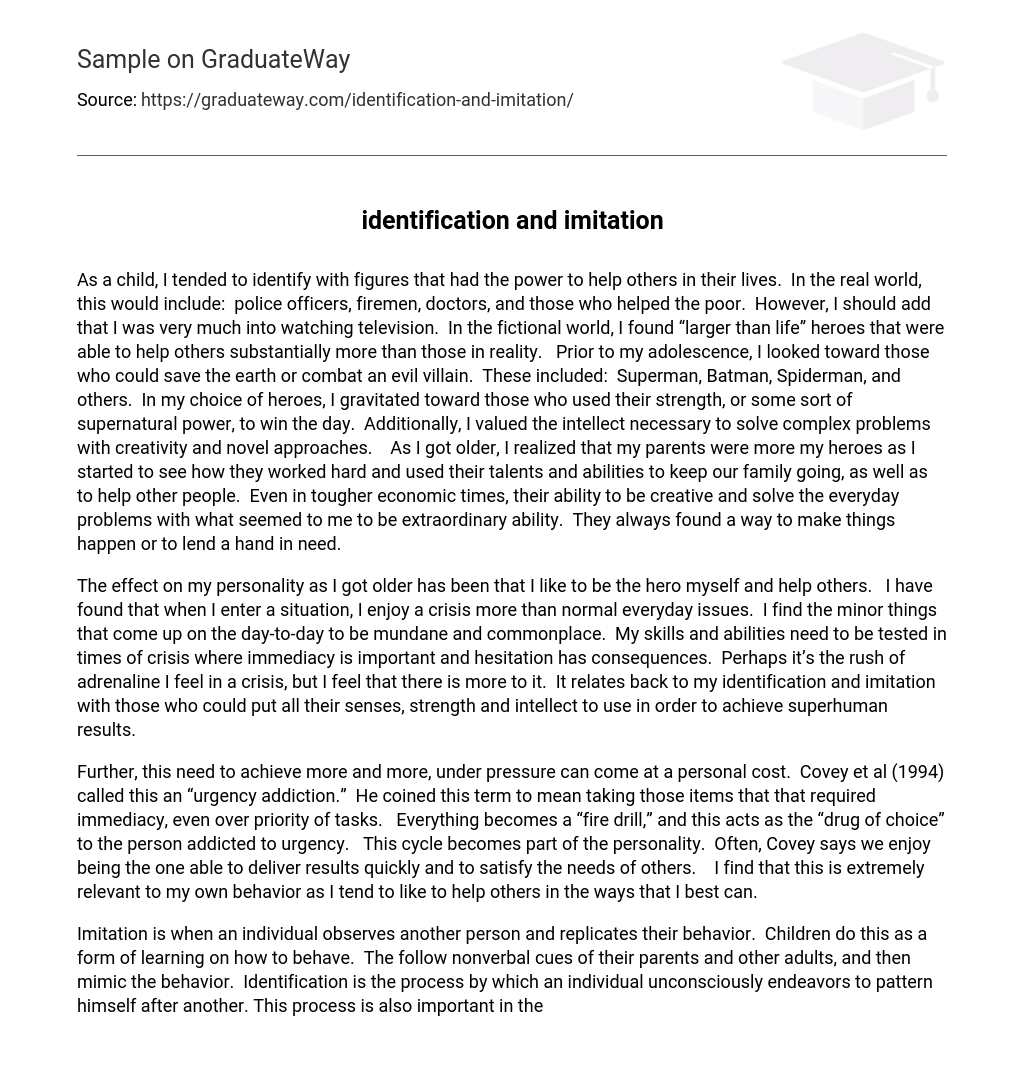As a child, I tended to identify with figures that had the power to help others in their lives. In the real world, this would include: police officers, firemen, doctors, and those who helped the poor. However, I should add that I was very much into watching television. In the fictional world, I found “larger than life” heroes that were able to help others substantially more than those in reality. Prior to my adolescence, I looked toward those who could save the earth or combat an evil villain. These included: Superman, Batman, Spiderman, and others. In my choice of heroes, I gravitated toward those who used their strength, or some sort of supernatural power, to win the day. Additionally, I valued the intellect necessary to solve complex problems with creativity and novel approaches. As I got older, I realized that my parents were more my heroes as I started to see how they worked hard and used their talents and abilities to keep our family going, as well as to help other people. Even in tougher economic times, their ability to be creative and solve the everyday problems with what seemed to me to be extraordinary ability. They always found a way to make things happen or to lend a hand in need.
The effect on my personality as I got older has been that I like to be the hero myself and help others. I have found that when I enter a situation, I enjoy a crisis more than normal everyday issues. I find the minor things that come up on the day-to-day to be mundane and commonplace. My skills and abilities need to be tested in times of crisis where immediacy is important and hesitation has consequences. Perhaps it’s the rush of adrenaline I feel in a crisis, but I feel that there is more to it. It relates back to my identification and imitation with those who could put all their senses, strength and intellect to use in order to achieve superhuman results.
Further, this need to achieve more and more, under pressure can come at a personal cost. Covey et al (1994) called this an “urgency addiction.” He coined this term to mean taking those items that that required immediacy, even over priority of tasks. Everything becomes a “fire drill,” and this acts as the “drug of choice” to the person addicted to urgency. This cycle becomes part of the personality. Often, Covey says we enjoy being the one able to deliver results quickly and to satisfy the needs of others. I find that this is extremely relevant to my own behavior as I tend to like to help others in the ways that I best can.
Imitation is when an individual observes another person and replicates their behavior. Children do this as a form of learning on how to behave. The follow nonverbal cues of their parents and other adults, and then mimic the behavior. Identification is the process by which an individual unconsciously endeavors to pattern himself after another. This process is also important in the development of the personality, particularly the superego or conscience, which is modeled largely on the behavior of adult significant others (Isham, 1956).
There is a difference between imitation and identification. Imitation involves a conscious decision to observe and imitate behavior. Identification is done unconsciously. Freud stated that children develop their morality this way. In their development, children will incorporate characteristics of the parents’ superegos into their own. An example of which is seen as a young male child will begin to take on characteristics of his father. He will act more like his father than his mother, emulating what it means to be male. Also, children will develop a superego that has similarities to the moral values of their parents. These children are unconsciously observing how their parents live their lives. So, if the parents are honest people, the child should come to identify that honesty is important; and therefore it is wrong to lie. (Isham, 1956).
Overall, as I look the formative figures I had when I was younger and maturing, it could be said that I imitated superhero behavior, but I identified with my parents. Either way, it reinforced my interest in helping others.
References:
Covey, Stephen, Merrill, A. Roger & Merrill, Rebecca R. (1994). First Things First: To Live, to Love, to Learn, to Leave a Legacy. New York: Simon and Schuster.
Isham, A.C. (1956). Imitation and Identification. The Psychoanalytic Review, 43:397-410. Retrieved November 24, 2008, from http://www.pep-web.org/





